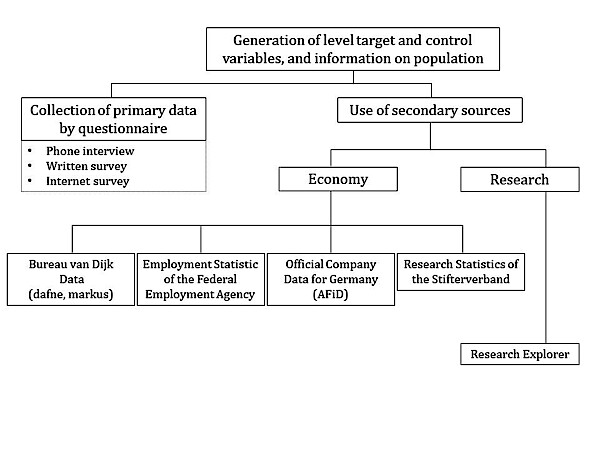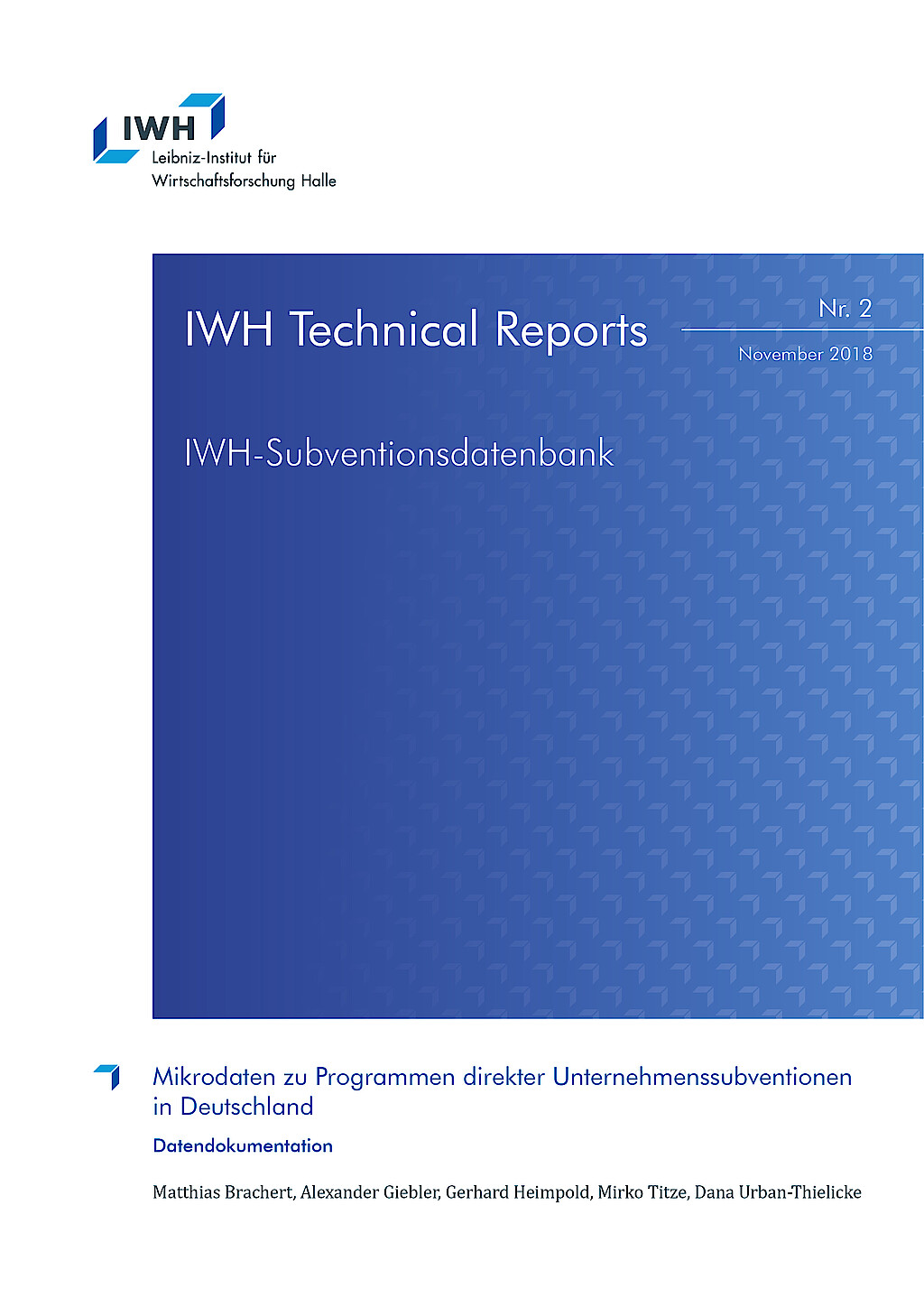IWH Subsidy Databse

The microdatabase currently comprises nine data sets on direct business subsidy programmes in Germany.
The programme statistics kept by the project sponsors and the responsible ministries are compiled in a database. It is possible to link this with company data from other sources. This is the prerequisite for causal analyses of the effectiveness of company subsidies.
Background
Every year, companies in Germany receive subsidies from the German state, the Laender, and the European Union. These are quite high, ranging in double-digit billion Euro payments. These massive state interventions are controversially discussed in economics. On the one hand, subsidies can be justified by the imperfection of markets. Certain entrepreneurial activities (e.g. investments in innovative technologies) might not be achieved to the extent desired by society. On the other hand, there is the real danger that taxpayers' money is being wasted (bandwagon effect). Also, economic disincentives can lead to the artificial prolongation of industries which are no longer able to compete (coal mining subsidies).
In order to be able to judge whether a certain subsidy programme makes sense or whether the state should spend the money elsewhere, it is important to clarify the programme’s exact impact. The international standard of evidence-based outcome research is to compare the group of subsidised companies to businesses, which do not receive subsidies (but are otherwise similar companies). Did the supported companies actually move towards the direction the programme aims at? Or is there no change in subsidised businesses' performance, which would render the support pointless?
Outcome analyses require good data. These, however, are not easily attained. Companies can get subsidies from different state levels (state, regions, European Union). There is a magnitude of programmes, which often are similar in their coverage. Information on the recipient, amount, and duration of subsidies are normally not freely accessible. Nevertheless, the administrative statistics do not include information on the supported companies. Up until now, there is no overview in Germany (not to speak of a database), which categorises the subsidy practices of businesses.
Data and Methods
The micro database on companies’ project funding was developed by the IWH’s Centre for Evidence-based Policy Advice (IWH-CEP). It aims to build a comprehensive database on direct company funding in Germany. The different programme statistics are combined in a consistent data structure. This data on firms’ funding can then be linked to additional data on the supported companies deriving from other sources.
Project funding refers to state subsidies companies may apply for to realise investment, research or development projects. Thus, the IWH database does not include subsidies, which are granted indirectly through the tax system (e.g. investment grants or special amortisations).
As of September 2018, the database includes nine different administrative datasets of project funding for companies in Germany:
- Funding catalogue
- Funding catalogue of the Sächsische Aufbaubank
- Funding catalogue of the Land Saxony-Anhalt
- Central Innovation Programme Mittelstand (Zentrales Innovationsprogramm Mittelstand, ZIM), Coop + Solo
- Pro Inno + Pro Inno II (precursor of ZIM)
- EU FP 7
- EU FP 6
- Joint task: ‘Improvement of the regional economic structure’
- Joint task: ‘Improvement of the regional economic structure ‘ + Thuringia Invest + Thuringia Dynamics
The single data schemes are transformed into a new, joint scheme. Basic information (e.g. project-ID, project title, project start and end, amount of funding) from the different funding data sources are made comparable by unifying variable formats. A standard regional reference is added.
The funding data can be merged with company data from the following sources:

Further information on coverage, structure and methodology of the IWH Subsidy Database is given by the data report below.
Data Report

IWH-Subventionsdatenbank: Mikrodaten zu Programmen direkter Unternehmenssubventionen in Deutschland. Datendokumentation
in: IWH Technical Reports, No. 2, 2018
Abstract
Nahezu alle entwickelten Volkswirtschaften haben Programme zur Förderung von Projekten in Unternehmen im Rahmen von Industriepolitik eingeführt. Allerdings ist sehr wenig darüber bekannt, welche Programme eigentlich genau zur Anwendung kommen, welche finanziellen Mittel dafür aufgebracht werden und ob die Programme in der Art und Weise wirken, wie sie ursprünglich intendiert waren. Evaluationsstudien, die auf kausalen Untersuchungsdesigns basieren, können einen wertvollen Beitrag zur Beantwortung der Frage leisten, ob ein Programm tatsächlich Wirkungen entfaltet und welcher der verschiedenen Ansätze am erfolgversprechendsten ist. Dieser Datenreport stellt die vom Zentrum für evidenzbasierte Politikberatung am Leibniz-Institut für Wirtschaftsforschung Halle (IWH-CEP) entwickelte IWH-Subventionsdatenbank vor. Die Datenbank enthält (Stand November 2018) zehn Programme industriepolitischer Maßnahmen, die in Deutschland zur Anwendung kamen bzw. kommen. Der Report geht auf die Förderregeln dieser Programme ein und beschreibt die Prozeduren der Zusammenführung zu einer Masterdatei. Ferner diskutiert der Report Möglichkeiten der Verknüpfung der Förderdaten mit externen Unternehmensdatensätzen, die eine zwingende Voraussetzung für die Durchführung von Wirkungsanalysen darstellen, da die administrativen Förderdaten nicht alle Informationen enthalten, die für kausale Untersuchungsdesigns notwendig sind.
Data Access
The IWH provides external researchers with this data for non-commercial research purposes only. Usage is granted upon application. If a research interest is documented, data can be used at specific workplaces for guest researchers on IWH premises. Due to confidentiality agreements between the IWH and the providers of raw data, the database usage needs to be done in cooperation with IWH researchers.
Please complete the application form with your personal data and a detailed research proposal, which documents your research interest. Based on this information we will conclude a user contract. Please note our terms of use.
For further questions please contact: fdz@iwh-halle.de.
Research Questions
Micro data research on direct company funding at IWH-CEP is currently centering around two aspects:
- Analysis of causal effects of programmes of direct company funding on economic policy targets
- Analyses of the selection of companies for specific programmes
Apart from being applied in research, the data are being used for targeted economic advising on regional, national, and international level. Thus, the IWH subsidy database is contributing to the evidence-based research on the effects of firm funding from a business, as well as from a regional perspective.
The project is coordinated by the IWH Centre for Evidence-based Policy Advice (IWH-CEP), and supervised by the IWH Research Data Centre.



